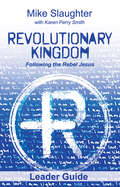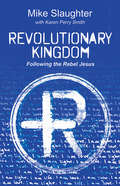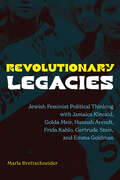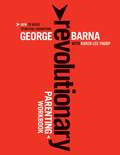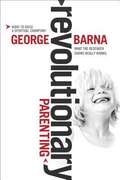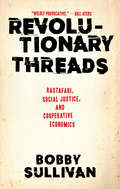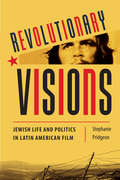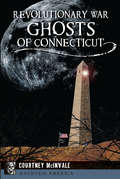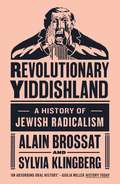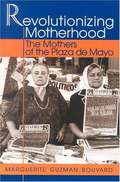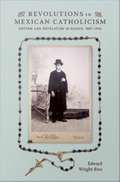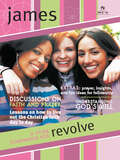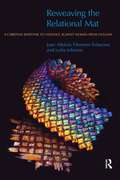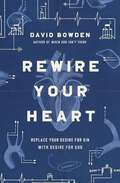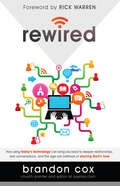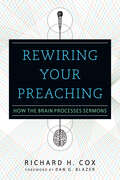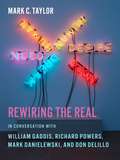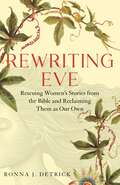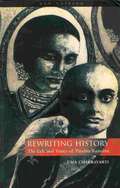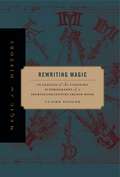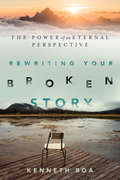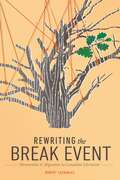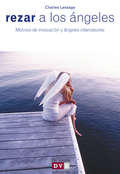- Table View
- List View
Revolutionary Kingdom Leader Guide: Following the Rebel Jesus (Revolutionary Kingdom)
by Mike SlaughterWhat exactly is a disciple, and how will we know if we have made one? There are three core values that a disciple embodies: undiluted devotion to the Lordship of Jesus Christ, a Kingdom of God worldview, and a missional lifestyle.In Revolutionary Kingdom: Following the Rebel Jesus, author and Pastor Mike Slaughter explores why we must exchange comfortable cultural worldviews and values for the radical requirements of living out the Kingdom of God on Planet Earth. When God’s people get serious about this call, it’s revolutionary. Jesus himself was the most radical revolutionary who ever lived and provided us a vision of a kingdom worth dying for.Welcome to the revolution!The Leader Guide contains everything needed to guide a group through the six-week study including session plans, activities, and discussion questions, as well as multiple format options.
Revolutionary Kingdom: Following the Rebel Jesus (Revolutionary Kingdom)
by Mike SlaughterWhat exactly is a disciple, and how will we know if we have made one? There are three core values that a disciple embodies: undiluted devotion to the Lordship of Jesus Christ, a Kingdom of God worldview, and a missional lifestyle.In Revolutionary Kingdom: Following the Rebel Jesus, author and Pastor Mike Slaughter explores why we must exchange comfortable cultural worldviews and values for the radical requirements of living out the Kingdom of God on Planet Earth. When God’s people get serious about this call, it’s revolutionary. Jesus himself was the most radical revolutionary who ever lived and provided us a vision of a kingdom worth dying for.Welcome to the revolution!Additional components for a six-week study include a DVD featuring Mike Slaughter and a comprehensive Leader Guide.
Revolutionary Legacies: Jewish Feminist Political Thinking with Jamaica Kincaid, Golda Meir, Hannah Arendt, Frida Kahlo, Gertrude Stein, and Emma Goldman (SUNY series in Feminist Criticism and Theory)
by Marla BrettschneiderThis book provides a timely new transnational lineage of Jewish feminist revolutionary legacies. Using extensive research, deep thinking, and a bold methodology, Marla Brettschneider tousles with a host of anti-colonial, feminist, anti-racist, and queer troublemakers—Jamaica Kincaid, Golda Meir, Hannah Arendt, Frida Kahlo, Gertrude Stein, and Emma Goldman. Brettschneider brings together these feisty women's lives, work, politics, thinking, and art to wrestle with big questions: How can we make our lives, individually and collectively, in our diversity as Jews and in grounded solidarity with others? How do these women bring out otherwise unidentified, unnamed, and underexamined issues in Jewish studies, feminism, politics, and a range of critical theories? Revolutionary Legacies invites Jews, feminists, anti-racists, and all manner of justice seekers to think, and create common cause, with these rabblerousers.
Revolutionary Parenting Workbook: How to Raise Spiritual Champions
by George Barna Karen Lee-ThorpRevolutionary Parenting (Tyndale) was developed from a landmark study of Christian twenty-somethings and the parents who raised them. In this groundbreaking release, author George Barna shared how these fathers and mothers created a lasting legacy of faith in their children.The Revolutionary Parenting Workbook was created to move parents from insight to application. This guide is designed to help any parent raise spiritual champions that will love and serve God into adulthood. Far from a formulaic approach, the workbook and DVD allows readers to create a unique plan for their child.
Revolutionary Parenting: What the Research Shows Really Works
by George BarnaGeorge Barna researched the lives of thriving adult Christians and discovered the essential steps their parents took to shape their spiritual lives in childhood.
Revolutionary Threads: Rastafari, Social Justice, and Cooperative Economics
by Bobby SullivanAn American Rastafarian “offers a vibrant examination of American and African history with an anti-colonial patina . . . engaging” (Kirkus Reviews).Revolutionary Threads offers an American Rasta’s retelling of episodes in American history with an anticolonial thrust, accented by Bobby Sullivan’s own personal experiences. The book ties together various subjects while returning each time to the culture of Rastafari, social justice movements, and cooperative economics. From how we perceive history in general, America's precolonial past, and global capitalism’s early development and the resistance to it, to political prisoners and a celebration of religious tolerance, the book approaches North America with an African-centric perspective. Sullivan dispels the oversimplification of our perceptions of Rastafari, as well as other cultures, in the age of the Internet, where the loudest voices are often the most extreme and divisive. Revolutionary Threads aims to serve as a unifying agent for our all-too-connected global village, and for the resistance to the consolidation of global capital and all its excesses.“A post-hardcore rock star, community activist, and social justice intellectual offers an alternative look at countercolonial history through the lens of the Rastafari movement.” —Kirkus Reviews“Outlining his philosophical influences and backpacking through history and criss-crossing continental borders, Sullivan puts his enlightenment journey and way of life, which includes activism for social justice, prison outreach, and cooperative economics, on paper.” —The Gleaner (Jamaica)“[Sullivan] meticulously sources his work throughout, whether providing a Howard Zinn-like take on the settlement of America by Africans predating Columbus, or in discussing political prisoners like Marilyn Buck . . . an engaging, lively, well-thought book which provides a picture of Rastafarianism in action, for punks and beyond.” —Razorcake
Revolutionary Visions: Jewish Life and Politics in Latin American Film (LATINOAMERICANA)
by Stephanie M. PridgeonRevolutionary Visions examines recent cinematic depictions of Jewish involvement in 1960s and 1970s revolutionary movements in Latin America. In order to explore the topic, the book bridges critical theory on religion, politics, and hegemony from regional Latin American, national, and global perspectives. Placing these theories in dialogue with recent films, the author asks the following questions: How did revolutionary commitment change Jewish community and families in twentieth-century Latin America? How did Jews contribute to revolutionary causes, and what is the place of Jews in the legacies of revolutionary movements? How is film used to project self-representations of Jewish communities in the national project for a mainstream audience? Jewish involvement in revolutionary movements is rife with contradictions. On the one hand, it was a natural progression of patterns of political participation, based on the ideological affinities shared between socialist movements and Marxist revolutionary politics. On the other hand, involvement in revolutionary politics would also upset the status quo of Jewish communities because of the extreme nature of revolutionary practices (e.g., guerrilla warfare), revolutionary groups’ alignment with Palestine, and the assimilation into non-Jewish culture that revolutionary involvement often entailed. These contradictions between Jewish self-identification and revolutionary activity continue to confound cultural understandings of the points of contact between identities and political affinities. In this way, Revolutionary Visions contributes to timely debates within cultural studies surrounding identities and politics.
Revolutionary War Ghosts of Connecticut (Haunted America)
by Courtney McInvaleThe founder of Seaside Shadows Haunted History Tours sheds light on the supernatural stories of the Constitution State. Bloody battlefields and raucous taverns in Connecticut served as the backdrop for pivotal figures and bold actions vital to the American Revolution. Nathan Hale is said to still conduct lessons in New London and East Haddam, and many suspect that George Washington occasionally visits the Shaw Mansion and Fairfield's Sun Tavern. The presence of notorious traitor Benedict Arnold is often felt in the Leffingwell Inn and at Ye Antientist Burial Ground in New London, where he commanded troops numbering 1,600 as a newly turned Loyalist. Picnickers claim to see apparitions of wounded soldiers seated among them at Fort Griswold in Groton. Step foot into a time when the Sons of Liberty, Tories and Patriots changed the course of history as author Courtney McInvale uncovers the Revolutionary haunts of Connecticut.
Revolutionary Yiddishland: A History of Jewish Radicalism
by David Fernbach Sylvie Klingberg Alain BrossatRecovering the history of the revolutionary Jewish traditionJewish radicals manned the barricades on the avenues of Petrograd and the alleys of the Warsaw ghetto; they were in the vanguard of those resisting Franco and the Nazis. They originated in Yiddishland, a vast expanse of Eastern Europe that, before the Holocaust, ran from the Baltic Sea to the western edge of Russia and incorporated hundreds of Jewish communities with a combined population of some 11 million people. Within this territory, revolutionaries arose from the Jewish misery of Eastern and Central Europe; they were raised in the fear of God and taught to respect religious tradition, but were caught up in the great current of revolutionary utopian thinking. Socialists, Communists, Bundists, Zionists, Trotskyists, manual workers and intellectuals, they embodied the multifarious activity and radicalism of a Jewish working class that glimpsed the Messiah in the folds of the red flag. Today, the world from which they came has disappeared, dismantled and destroyed by the Nazi genocide. After this irremediable break, there remain only survivors, and the work of memory for red Yiddishland. This book traces the struggles of these militants, their singular trajectories, their oscillation between great hope and doubt, their lost illusions--a red and Jewish gaze on the history of the twentieth century.From the Hardcover edition.
Revolutionizing Motherhood:The Mothers of the Plaza de Mayo
by Marguerite Buzman Bouvarda group of Argentinian middle-aged women, when faced with political tyranny, fought back in a way no one could have imagined. This is the author's outsider-view of The Mothers.
Revolutions in Mexican Catholicism: Reform and Revelation in Oaxaca, 1887-1934
by Edward Wright-RiosIn Revolutions in Mexican Catholicism, Edward Wright-Rios investigates how Catholicism was lived and experienced in the Archdiocese of Oaxaca, a region known for its distinct indigenous cultures and vibrant religious life, during the turbulent period of modernization in Mexico that extended from the late nineteenth century through the early twentieth. Wright-Rios centers his analysis on three "visions" of Catholicism: an enterprising archbishop's ambitious religious reform project, an elderly indigenous woman's remarkable career as a seer and faith healer, and an apparition movement that coalesced around a visionary Indian girl. Deftly integrating documentary evidence with oral histories, Wright-Rios provides a rich, textured portrait of Catholicism during the decades leading up to the Mexican Revolution of 1910 and throughout the tempestuous 1920s. Wright-Rios demonstrates that pastors, peasants, and laywomen sought to enliven and shape popular religion in Oaxaca. The clergy tried to adapt the Vatican's blueprint for Catholic revival to Oaxaca through institutional reforms and attempts to alter the nature and feel of lay religious practice in what amounted to a religious modernization program. Yet some devout women had their own plans. They proclaimed their personal experiences of miraculous revelation, pressured priests to recognize those experiences, marshaled their supporters, and even created new local institutions to advance their causes and sustain the new practices they created. By describing female-led visionary movements and the ideas, traditions, and startling innovations that emerged from Oaxaca's indigenous laity, Wright-Rios adds a rarely documented perspective to Mexican cultural history. He reveals a remarkable dynamic of interaction and negotiation in which priests and parishioners as well as prelates and local seers sometimes clashed and sometimes cooperated but remained engaged with one another in the process of making their faith meaningful in tumultuous times.
Revolve Study Guide
by Thomas NelsonThe Revolve/Refuel Study Guide Series is the coolest way for teens to study chosen books of the Bible including Mark and James. In a mini-magazine format, each guide will contain seven chapters along with sections and sidebars similar to Revolve and Refuel (NCV). Each chapter focuses on building the reader's knowledge of the Bible while nurturing an understanding of what the Bible has to say in reference to their own lives. The Revolve/Refuel Study Guide Series will not only serve teens by providing Biblical truth-- it will make studying the Bible easy, and most importantly, awesome!
Reweaving the Relational Mat: A Christian Response to Violence Against Women from Oceania (Religion and Violence)
by Joan Filemoni-Tofaeono Lydia JohnsonReweaving the Relational Mat is an integrative response to the problem of violence against women which grounds theological and sociological analysis in the praxis of Oceanian Christian women's experiences of violence. It focuses on the collusion of the church in the problem of violence against women by critiquing the ways in which its theology and practices have contributed to 'power-over' ways of relating. Employing the Oceanian metaphor of weaving the mat, the analysis 'unravels' the 'patriarchal relational mat,' paving the way for a constructive 'reweaving' of a Christocentric 'egalitarian relational mat.' The study begins by unravelling the correlation between violence and the ideology of patriarchy. It then highlights the various strands of violence against women, and examines the complex mosaic of socio-cultural sources and manifestations of violence against women in Oceania. This leads to an analysis of the interwoven strands of religion and violence, focusing particularly on the church's captivity to patriarchy. The ensuing explication of problematic theological and biblical interpretations and church practices ends with a critique of male clergy power, particularly as it functions in the Oceanian context. This leads to an examination of the relationship between flawed theological education and violence against women. Case studies of violence against women in the Oceanian theological education setting are analysed. The subsequent 'reweaving of the relational mat' issues forth in specific challenges to church leaders, theological educators and church women.
Rewire Your Heart: Replace Your Desire for Sin with Desire For God
by David BowdenBible teacher and acclaimed spoken-word artist David Bowden reveals the secret to winning the battle with sin.Many Christians believe the only way to fight sin is to grit our teeth, strengthen our resolve, and rise above the onslaught of temptation. But in reality, we have a far better weapon in our struggle with sin than the will-power mantras associated with diet and exercise. This weapon is not saying "no" to sin but saying "yes" to God. In Rewire Your Heart, David Bowden helps us discover God's plan to overcoming sin by rewiring our desires with the Gospel. When we invite the Holy Spirit to transform our underlying affections with the good news of Jesus, we begin to break free from the patterns of sin, guilt, and determination, and discover the richer fulfillment found in joyfully obeying God's commands.
Rewired: How Using Today's Technology Can Bring You Back to Deeper Relationships, Real Conversations, and the Age-Old Methods of Sharing God's Love
by Brandon CoxIf God’s desire to enlarge His family matters... If the church of the future matters... If the gospel still matters... We must embrace the changes that are happening in our world. There is no going back. Our world is changing at an unprecedented rate. We are connected with people all over the planet through technology that didn’t even exist ten years ago. The world around us is having a conversation about life, meaning, culture, and eternity, and we have an amazing opportunity not just to join the conversation but also to lead it. But too many in the church are struggling to keep up with this cultural shift and failing to use these communication tools to their full advantage. In Rewired Brandon Cox demonstrates the real, connecting power in online social networks, showing you how to connect and tell God’s story relationally and creatively in our social, digital age. Because the thing is, social media isn’t an escape from the real world. It is the real world, whether we are ready for it or not. And this shift we are seeing toward a more mobile, social environment is actually a return to the form we were created for: to be in relationships, to have conversations, and to share our stories--and God’s--with each other.
Rewiring Your Preaching: How the Brain Processes Sermons
by Richard H. CoxWhat preachers preach is not necessarily what hearers hear. Have you ever wondered why some hearers are affected by a sermon but not others? The issue may not necessarily be the content or delivery of the message. It may be how your hearers' brains process what you say. Modern neuroscience illuminates how our brains understand and hear sermons. Verbal stimuli can be accepted or rejected depending on the context of how they are received. The brain processes new information differently than information that reinforces already-held beliefs. To have long-term effect, new information must connect with previous memory. Psychologist, physician and preacher Richard Cox shows that better understanding of the brain can help preachers be more effective in their preaching. Intentional, purposeful preaching can actually produce new neural pathways that change how the brain thinks and how its owner acts. Our brains are intimately connected with how our bodies work, especially in how brain stimuli produce behavioral responses and how people experience comfort and healing in times of pain. God is at work in our brains to enable his people to hear him. Preach with the brain in mind, and help your hearers grow in mental, physical and spiritual health.
Rewiring the Real: In Conversation with William Gaddis, Richard Powers, Mark Danielewski, and Don DeLillo (Religion, Culture, and Public Life #12)
by Mark C. TaylorDigital and electronic technologies that act as extensions of our bodies and minds are changing how we live, think, act, and write. Some welcome these developments as bringing humans closer to unified consciousness and eternal life. Others worry that invasive globalized technologies threaten to destroy the self and the world. Whether feared or desired, these innovations provoke emotions that have long fueled the religious imagination, suggesting the presence of a latent spirituality in an era mistakenly deemed secular and posthuman.William Gaddis, Richard Powers, Mark Danielewski, and Don DeLillo are American authors who explore this phenomenon thoroughly in their work. Engaging the works of each in conversation, Mark C. Taylor discusses their sophisticated representations of new media, communications, information, and virtual technologies and their transformative effects on the self and society. He focuses on Gaddis's The Recognitions, Powers's Plowing the Dark, Danielewski's House of Leaves, and DeLillo's Underworld, following the interplay of technology and religion in their narratives and their imagining of the transition from human to posthuman states. Their challenging ideas and inventive styles reveal the fascinating ways religious interests affect emerging technologies and how, in turn, these technologies guide spiritual aspirations. To read these novels from this perspective is to see them and the world anew.
Rewriting Eve: Rewriting Eve: Rescuing Women's Stories from the Bible and Reclaiming Them As Our Own
by Ronna DetrickWe wouldn’t consider letting Isis, Medusa, Pandora, or Persephone slip from our lexicon. To somehow forget the legend of Harriet Tubman, Anne Frank, or Mother Teresa would never cross our minds. And yet when it comes to the stories of Eve and other biblical characters, they are rarely known, barely appreciated, and ostensibly “lost” by most of us not deeply entwined within organized religion. Trapped in patriarchy and theological argument, dismissed as irrelevant, or viewed as unchangeable even as times change, these women’s voices, desires, and hearts have too often been silenced through misunderstanding and neglect. As result, we are as well. But when they are reimagined, deconstructed, disentangled from doctrine and dogma, and heard on their own terms, these stories become powerful inspiration and a source of discernment that reconnects us to a feminine lineage and a sovereign sense of self we’ve never known to call on or trust. In Rewriting Eve: Rescuing Women's Stories from the Bible and Reclaiming Them As Our Own Ronna Detrick invites us into the presence and power of ten sacred women, revealing the endlessly relevant ways in which they speak today and showing how they can heal, embolden, and transform our stories.
Rewriting History: The Life and Times of Pandita Ramabai
by Uma ChakravartiThis book outlines the reconstitution of patriarchies in nineteenth century Maharashtra through an exploration of the life, work and times of Pandita Ramabai, one of India's earliest feminists.
Rewriting History: The Life and Times of Pandita Ramabai
by Uma ChakravartiIn this classic study of Pandita Ramabai's life, Uma Chakravarti brings to light one of the foremost thinkers of nineteenth-century India and one of its earliest feminists. A scholar and an eloquent speaker, Ramabai was no stranger to controversy. Her critique of Brahminical patriarchy was in sharp contrast to Annie Besant, who championed the cause of Hindu society. And in an act seen by contemporary Hindu society as a betrayal not only of her religion but of her nation, Ramabai - herself a high-caste Hindu widow - chose to convert to Christianity. Chakravarti's book stands out as one of the most important critiques of gender and power relations in colonial India, with particular emphasis on issues of class and caste.
Rewriting Magic: An Exegesis of the Visionary Autobiography of a Fourteenth-Century French Monk (Magic in History)
by Claire FangerIn Rewriting Magic, Claire Fanger explores a fourteenth-century text called The Flowers of Heavenly Teaching. Written by a Benedictine monk named John of Morigny, the work all but disappeared from the historical record, and it is only now coming to light again in multiple versions and copies. While John’s book largely comprises an extended set of prayers for gaining knowledge, The Flowers of Heavenly Teaching is unusual among prayer books of its time because it includes a visionary autobiography with intimate information about the book’s inspiration and composition. Through the window of this record, we witness how John reconstructs and reconsecrates a condemned liturgy for knowledge acquisition: the ars notoria of Solomon. John’s work was the subject of intense criticism and public scandal, and his book was burned as heretical in 1323. The trauma of these experiences left its imprint on the book, but in unexpected and sometimes baffling ways. Fanger decodes this imprint even as she relays the narrative of how she learned to understand it. In engaging prose, she explores the twin processes of knowledge acquisition in John’s visionary autobiography and her own work of discovery as she reconstructed the background to his extraordinary book. Fanger’s approach to her subject exemplifies innovative historical inquiry, research, and methodology. Part theology, part historical anthropology, part biblio-memoir, Rewriting Magic relates a story that will have deep implications for the study of medieval life, monasticism, prayer, magic, and religion.
Rewriting Magic: An Exegesis of the Visionary Autobiography of a Fourteenth-Century French Monk (Magic in History)
by Claire FangerIn Rewriting Magic, Claire Fanger explores a fourteenth-century text called The Flowers of Heavenly Teaching. Written by a Benedictine monk named John of Morigny, the work all but disappeared from the historical record, and it is only now coming to light again in multiple versions and copies. While John’s book largely comprises an extended set of prayers for gaining knowledge, The Flowers of Heavenly Teaching is unusual among prayer books of its time because it includes a visionary autobiography with intimate information about the book’s inspiration and composition. Through the window of this record, we witness how John reconstructs and reconsecrates a condemned liturgy for knowledge acquisition: the ars notoria of Solomon. John’s work was the subject of intense criticism and public scandal, and his book was burned as heretical in 1323. The trauma of these experiences left its imprint on the book, but in unexpected and sometimes baffling ways. Fanger decodes this imprint even as she relays the narrative of how she learned to understand it. In engaging prose, she explores the twin processes of knowledge acquisition in John’s visionary autobiography and her own work of discovery as she reconstructed the background to his extraordinary book. Fanger’s approach to her subject exemplifies innovative historical inquiry, research, and methodology. Part theology, part historical anthropology, part biblio-memoir, Rewriting Magic relates a story that will have deep implications for the study of medieval life, monasticism, prayer, magic, and religion.
Rewriting Your Broken Story: The Power of an Eternal Perspective
by Kenneth BoaHow do you fix a broken story? In this fallen world, life is often not how we thought it would be. Jobs vanish, relationships crumble, health fails. How do we find the hope to persevere? We can make sense of our broken stories by seeing them in the context of a larger and greater story. Kenneth Boa shows how God can transform our lives with an eternal perspective, when we live with the end in mind. In light of eternity, our struggles are temporary and our plot twists are not fatal. We are hard-wired by God with eternity in our hearts, and that longing gives us purpose, blesses others and helps us make a lasting mark on the world. Knowing our future is crucial to living our present. When we see our stories within his greater story, we learn to live with a heavenly perspective and follow it all the way home.
Rewriting the Break Event: Mennonites and Migration in Canadian Literature
by Robert ZachariasDespite the fact that Russian Mennonites began arriving in Canada en masse in the 1870s, Mennonite Canadian literature has been marked by a compulsive retelling of the mass migration of some 20,000 Russian Mennonites to Canada following the collapse of the “Mennonite Commonwealth” in the 1920s. This privileging of a seminal dispersal within the community’s broader history reveals the ways in which the 1920s narrative has come to function as an origin story, or “break event,” for the Russian Mennonites in Canada, serving to affirm a communal identity across national and generational boundaries. Drawing on recent work in diaspora studies, Rewriting the Break Event offers a historicization of Mennonite literary studies in Canada, followed by close readings of five novels that rewrite the Mennonite break event through specific strains of emphasis, including a religious narrative, ethnic narrative, trauma narrative, and meta-narrative. The result is thoughtful and engaging exploration of the shifting contours of Mennonite collective identity, and an exciting new methodology that promises to resituate the discourse of migrant writing in Canada.
Rezar a los ángeles: Motivos de invocatión y ángeles intercesores
by Charles LessageSin que nos demos cuenta, los ángeles nos acompañan a lo largo de toda nuestra vida. ¿Quiénes son?; ¿cómo se perciben?; ¿tienen una apariencia humana?; ¿los oímos a través de voces o susurros?; ¿como podemos comunicarnos con ellos?. A través de este libro, aprenderáa entrar en contacto contodos los ángeles del cielo graciasa las oraciones, un acto único que conduce al Hombre hacia un estado de conciencia elevado. Charles Lessage es periodista y poeta. Sus investigaciones le han conducido a explorar las grandes corrientes filosóficas, poéticas y religiosas. En la actualidad trabaja en el ámbitode la meditación y la lucha contra la soledad. Es autor devarias recopilaciones y poemas.
